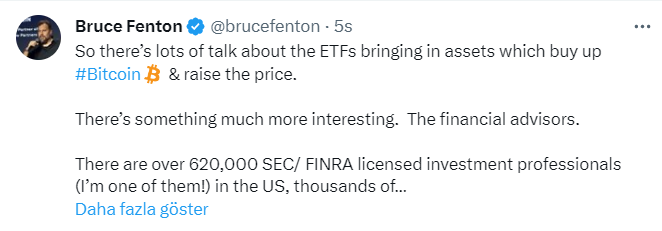Experienced finance expert Bruce Fenton shares his views on the transformative effect financial advisors can have on Bitcoin as Bitcoin ETFs start to attract attention. In the ongoing debates about Bitcoin ETFs and their potential to attract significant assets, Bruce Fenton offers a fascinating perspective. Fenton also believes that BTC will influence financial advisors.
Financial Advisor Landscape: A Game-Changing Force in the Bitcoin Arena
In the United States alone, there are over 620,000 SEC/FINRA licensed investment professionals, including thousands of broker-dealers and more than 15,000 Registered Investment Advisors (RIAs). These finance professionals collectively manage trillions of dollars, making them a formidable force in the investment environment.
Fenton highlights an impending significant shift in the field of finance professionals and investment experts. Despite managing a vast pool of assets, a significant portion of these professionals are not actively interested in Bitcoin or knowledgeable about it. However, Fenton anticipates a fundamental change due to several key factors.
Factors Driving Change: From Curiosity to Belief
The transformation is expected to be fueled by financial professionals’ innate tendencies to follow trends, be informed about market dynamics, and align their strategies with client interests. Fenton notes that many finance professionals may have a genuine interest or curiosity in Bitcoin but have not had the time to explore it due to their current product-focused responsibilities.

As Bitcoin’s performance and correlation with traditional markets become more evident, financial professionals and advisors are likely to recognize Bitcoin’s value in achieving well-balanced and diversified portfolios. Bitcoin’s inherent risk mitigation and hedging properties make it an attractive addition to various investment strategies.
Educational Initiatives and Marketing Forces
Fenton predicts that major investment firms will undertake industry-wide efforts to educate financial advisors and clients about Bitcoin. These efforts are expected to include powerful marketing campaigns featuring Chief Economists, industry experts, and CEOs advocating for Bitcoin’s inclusion in investment portfolios.
Investment firms are preparing to allocate significant resources to marketing skills to promote Bitcoin-based investments.
The launch of Bitcoin ETFs is expected to drive financial planning and asset allocation software products to incorporate these new assets. This integration will enable financial advisors to conduct in-depth analyses and seamlessly incorporate Bitcoin into both hypothetical and actual portfolios.
Ripple Effect: Financial Advisors as Future Advocates
As financial advisors gradually learn the nuances of Bitcoin, Fenton foresees a ripple effect. Turning to influential figures within the Bitcoin community, engaging in impactful videos, literature, and crypto-centric events could transform many financial advisors into fervent supporters.
Fenton envisions that some of the most important advocates for Bitcoin in the future may not even be believers today. Consequently, Fenton’s perspective offers an intriguing narrative about the collaboration between the traditional finance sector and the dynamic world of cryptocurrencies.
While acknowledging the potential drawbacks of Bitcoin ETFs, Fenton emphasizes the tremendous impact that financial advisors could have in shaping Bitcoin’s future trajectory. The coming together of Wall Street and the crypto community will open a new chapter in Bitcoin’s adoption and acceptance, marking the start of an exciting journey.

 Türkçe
Türkçe Español
Español









